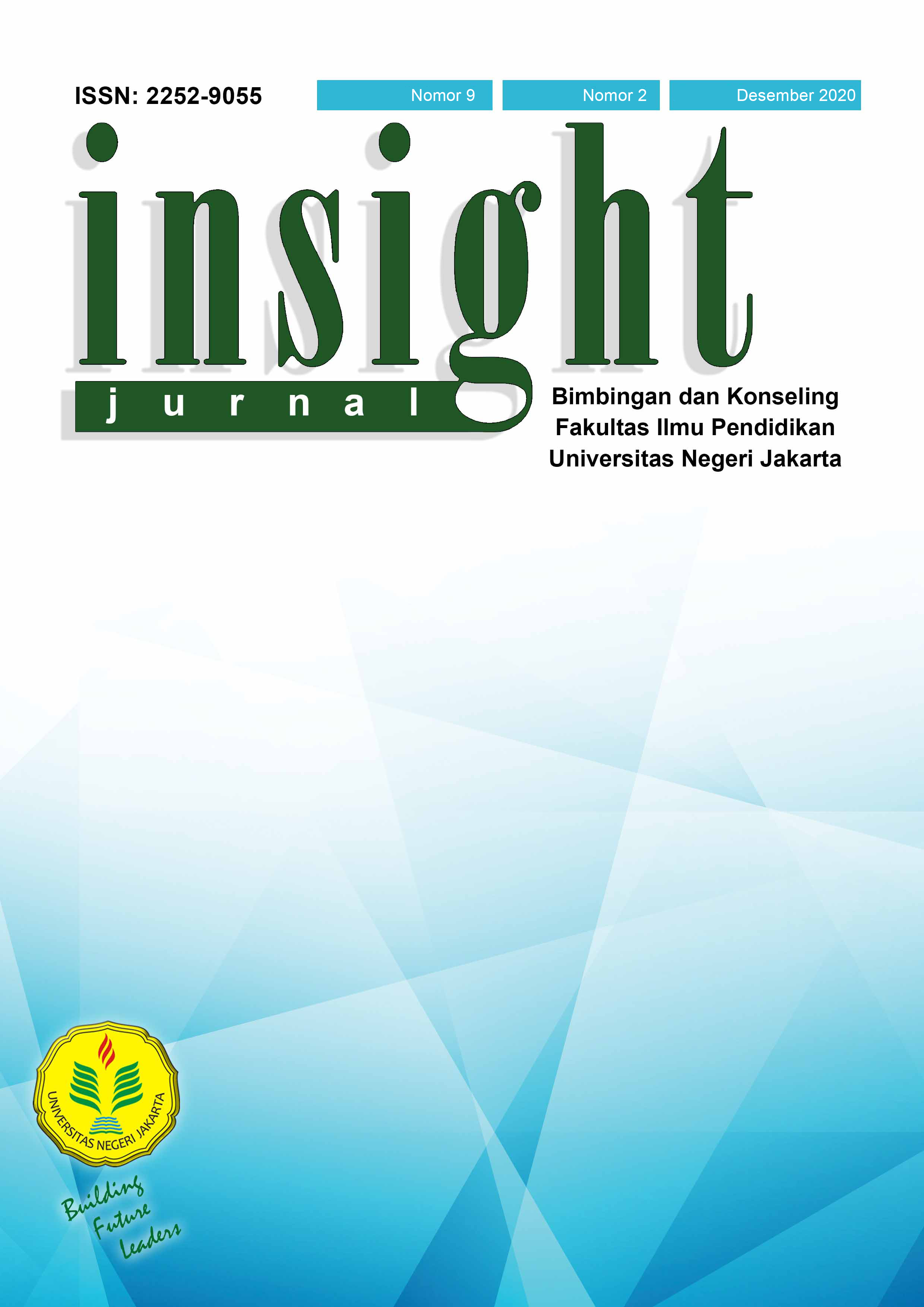Gambaran Penerimaan Diri Siswa yang Mengalami Perceraian Orangtua
DOI:
https://doi.org/10.21009/INSIGHT.092.04Keywords:
Penerimaan Diri, Siswa, Perceraian OrangtuaAbstract
Penelitian ini Bertujuan untuk mengetahui gambaran penerimaan diri remaja yang mengalami perceraian orangtua yang dialami oleh siswa Sekolah Menengah Atas di SMAN 14 Jakarta. Tema penelitian ini memfokuskan pada gambaran penerimaan diri, dampak perceraian orangtua terhadap remaja dan faktor yang berpengaruh terhadap penerimaan diri. Pengambilan sampel menggunakan teknik critical case study berjumlah 2 orang. Penelitian ini bersifat kualitatif deskriptif dengan metode riset naratif (narrative research). Pengumpulan data melakukan wawancara mendalam (in depth interview) secara online, observasi melalui video call dan call whatsapp serta studi dokumentasi. Data tersebut didukung dengan data tambahan dari wawancara Guru BK, Wali kelas, dan Teman Sebaya. Hasil penelitian ini menyimpulkan bahwa siswa yang mengalami perceraian orangtua memiliki penerimaan diri yang cukup baik mereka mampu belajar dari perceraian yang orangtua yang mereka alami. Mereka memiliki permasalahan masing-masing disekolah yaitu pencapaian akademik yang rendah pada responden perempuan dan pergi dari mata pelajaran pada responden laki-laki. Namun di masa sekarang mereka sudah belajar dari perceraian orangtua mereka dan menjadi kekuatan untuk bangkit dari perceraian orangtua mereka.
Kata Kunci: Penerimaan diri, Siswa, Perceraian Orangtua
Abstract
This study aims to describe the self-acceptance of adolescents who experience parental divorce experienced by high school students at SMAN 14 Jakarta. The theme of this research focuses on the picture of self-acceptance, the impact of parental divorce on adolescents, and the factors that influence self-acceptance. Sampling using a purposive sampling technique amounted to 2 people. This research is a qualitative descriptive with a narrative research. Data collection conducted in-depth interviews (in-depth interviews) online, observation via video call and WhatsApp call, and documentation study. This data is supported by additional data from interviews with counseling teachers, homeroom teachers, and peers. The results of this study concluded that students who experienced parental divorce had good enough self-acceptance that they were able to learn from their parents' divorce. They have their respective problems in school, namely low academic achievement for female respondents and moving away from subjects for male respondents. But in the present they have learned from their divorce parents and become the strength to rise from their parents' divorce.
Keywords : Self-acceptance, Student, Parental Divorce
References
Badrujaman, A. (2015). Metode Penelitian Lanjutan dalam Bimbingan dan Konseling. Jakarta: Lembaga Pengembangan Pendidikan Universitas Negeri Jakarta.
Bernard, M. E. (Penyunt.). (2013). The Strength of Self-Acceptance Theory, Practice and Research. New York: Springer.
Bernard, M. E. (2013). The Strength of Self-Acceptance: Theory Practice and Research. . London: Springer.
Chase, S. E. (2005). Narrative Inquiry: Multiple Lenses, Approaches, Voices. In I. N. K. Denzin & Y. S. Lincoln (Eds.), The Sage handbook of qualitative research (pp. 651–679). Sage Publications Ltd.
Creswell, J. W. (2007). Qualitative inquiry and research design : Choosing among five approaches. California: Sage Publications, Inc.
Dariyo, A. (2007). Psikologi perkembangan, anak tiga tahun pertama . Bandung: PT. Refina Aditama.
Elliot, G. C. (2009). Family Matters : The Importance of Mattering to Family in Adolescence. West Sussex: Blackwell Publishing.
Germer, C. K. (2009). The Mindful Path To Self-Compassion. United States of America: The Guilford Press.
Gunarsa, S. D., & Gunarsa, Y. S. (2008). Psikologi Perkembangan Anak dan Remaja. Jakarta: PT. BPK Gunung Mulia.
Hurlock, E. B. (2006). Psikologi Perkembangan : suatu pendekatan sepanjang rentang kehidupan. Jakarta: Erlangga.
Krisnani, H., & Farakhiyah , R. (2010). Meningkatkan Kemampuan Pengambilan Keputusan pada Remaja Akhir dengan Menggunakan Metode Reality Therapy. Share: Social Work Jurnal, 29-38.
Lestari, S. (2012). Psikologi Keluarga : Penanaman Nilai dan Penanganan Konflik dalam Keluarga. Jakarta: Kencana .
Machdan, D. M., & Hartini, N. (2012). Hubungan Antara Penerimaan Diri dengan Kecemasan Menghadapi Dunia kerja pada Tunadaksa di UPT Rehabilitasi Sosial Cacat Tubuh Pasuruan. Jurnal Psikologi Klinis dan Kesehatan Mental, 79-85.
Marliani, R. (2016). Psikologi Perkembangan Anak dan Remaja. Bandung: CV Pustaka Setia.
Micucci, J. A. (2009). The adolescent in family therapy : harnessing the power of relationships (2nd ed.). New York: The Guilford Press.
Nasir, B. (2012). Faktor-faktor yang Mempengaruhi Perceraian di Kecamatan Sungai Kunjang Kota Samarinda. Jurnal Psikostudia Universitas Mulawarman, 31-48.
Puspitorini, I. (2019). Stop Perceraian Selamatkan Perkawinan. Temanggung: Desa Pustaka Indonesia.
Polkinghorne, D. E. (1995). Narrative configuration in qualitative analysis. International Journal of Qualitative Studies in Education, 8(1), 5–23. https://doi.org/10.1080/0951839950080103
Simon, T., Nepo, M., Hanson, R., & Neff, K. (2016). The Self-Acceptance Project: How to Be Kind and Compassionate Toward Yourself in Any Situation. Boulder: Soundstrue.
Syaifuddin, M., Turatmiyah, S., & Yahanan, A. (2013). Hukum Perceraian. jakarta Timur: Sinar Grafika.
Verauli, R. (2018). Teenager 911. Jakarta Pusat: KataKita.
Wandberg, R. (2002). Self-Acceptance: building confidence. Mankato, Minnesota: Capstone Press.
Wangge, B. D., & Hartini, N. (2013). Hubungan antara Penerimaan Diri dengan Harga Diri pada Remaja pasca Perceraian Orangtua. Jurnal Psikologi Kepribadian dan Sosial, 1-6.
Downloads
Published
Issue
Section
License
Authors who publish with this Journal agree to the following terms:
- Author retain copyright and grant the journal right of first publication with the work simultaneously licensed under a creative commons attribution licensethat allow others to share the work within an acknowledgement of the work’s authorship and initial publication of this journal.
- Authors are able to enter into separate, additional contractual arrangementfor the non-exclusive distribution of the journal’s published version of the work (e.g. acknowledgement of its initial publication in this journal).
- Authors are permitted and encouraged to post their work online(e.g. in institutional repositories or on their websites) prior to and during the submission process, as it can lead to productive exchanges, as well as earlier and greater citation of published works.
Users/public use of this website will be licensed to CC BY







